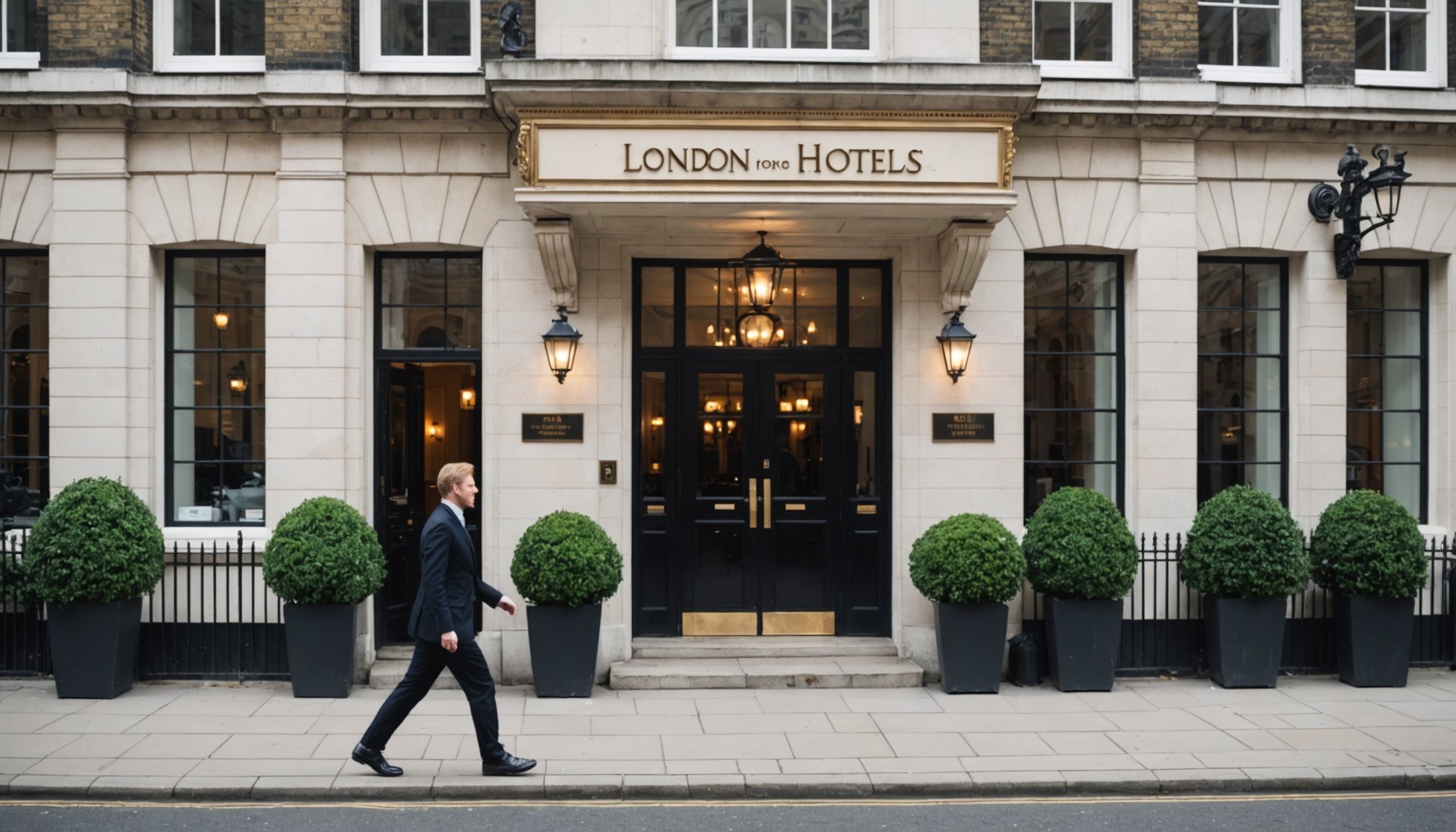Understanding Reputation Management
In the hotel industry, reputation management involves overseeing and influencing public perceptions of a hotel, particularly critical for hotels in competitive markets like London. Specifically for London hotels, maintaining a positive reputation is paramount, as the city hosts a multitude of accommodation options vying for guests’ attention. Reputation not only affects customer choices but also significantly impacts a hotel’s bottom line.
Negative publicity can severely affect business performance in several ways. A single incident or negative review has the potential to deter future guests and erode trust built over time. As potential customers often rely on reviews and social media feedback to make informed decisions, any adverse content can instantly influence their perceptions. For London hotels, which exchange on a bustling and globally diverse market, the ripple effects of negative publicity are amplified.
This might interest you : Essential techniques to elevate customer loyalty in london retail: a proven guide for success
Therefore, effective reputation management is not merely an option but a strategic necessity. By focusing on reputation, hotels in London can enhance customer satisfaction, foster loyalty, and sustain competitive prowess. Supervising responses to negative publicity and proactively managing guest interactions are essential practices to maintain a robust reputation in this dynamic industry.
Key Strategies for Reputation Management
In the London hotel industry, employing effective strategies is crucial to maintaining a positive reputation. Building an active online presence is a foundational tactic. London hotels can boost their image by engaging consistently on platforms like social media, sharing updates, and responding to queries. This engagement begins with understanding the needs of the audience, tailoring content to resonate, and fostering community involvement.
Additional reading : Transforming client communication: harnessing chatbots to elevate engagement in london”s legal sector
Customer reviews serve as valuable feedback mechanisms. By actively seeking and addressing reviews, hotels can gain insights into guest experiences. This feedback loop helps identify areas of improvement and enhance service quality, thus solidifying reputation. Implementing systems that encourage guests to leave reviews on popular travels platforms like TripAdvisor can further amplify credibility.
A proactive approach to issue resolution is paramount. Addressing potential problems swiftly before they escalate ensures trust remains intact. Hotels achieving this demonstrate attentiveness to customer concerns, reinforcing reliability.
To summarize, these strategies—active online presence, leveraging customer reviews, and proactive issue management—formulate a robust framework for London hotels to enhance and sustain their reputation in the competitive hospitality landscape.
Social Media Management Techniques
In the dynamic landscape of the hotel industry, effective social media management is crucial for shaping a hotel’s brand image and maintaining customer engagement. Best practices for engaging with customers involve active participation and consistent interaction on platforms where guests spend much of their digital time. This includes employing a friendly yet professional tone, sharing intriguing content, and responding promptly to queries and comments.
Timely responses play a significant role in fostering a positive brand image. By swiftly addressing questions and concerns, hotels can demonstrate their commitment to customer satisfaction and cultivate lasting trust. This not only resolves issues quickly but also projects an aura of reliability that resonates with current and future guests.
Furthermore, leveraging social media analytics allows hotels to gain insights into public sentiment. Analyzing data on customer interactions can reveal trends, preferences, and potential areas for improvement. By understanding these patterns, hotels can continuously refine their social media strategies to better align with guest expectations.
In conclusion, mastering social media engagement through timely interactions and data-driven insights can significantly enhance a hotel’s reputation, ensuring it remains competitive in the bustling London market.
Customer Feedback Analysis
In the competitive London hotel industry, understanding and leveraging customer feedback is vital for maintaining a stellar reputation. Gathering insights begins with systematic collection methods. Hotels employ various tools, from digital surveys to in-person feedback forms, ensuring comprehensive input from guests. This wide-ranging data provides a platform for real-time service enhancements and long-term strategic planning.
Analyzing feedback requires meticulous attention to detail. Advanced software solutions can sift through vast amounts of data, identifying patterns and key sentiment drivers. This analysis highlights areas requiring improvement and pinpoints positive aspects of service that resonate with guests.
Turning feedback into actionable improvements is the crux of reputation management. By addressing concerns promptly, hotels foster customer satisfaction and loyalty. Moreover, regularly updating services based on guest suggestions ensures that hotel offerings stay relevant and competitive.
Satisfaction surveys, social media platforms, and review sites are instrumental in painting a holistic picture of customer perceptions. Actively engaging with these tools not only enriches the guest experience but also bolsters a hotel’s reputation. As a result, London hotels that excel in transforming feedback into tangible action stand out in a crowded marketplace.
Crisis Communication Strategies
In the bustling hotel industry, effective crisis management is imperative for safeguarding a hotel’s reputation. A structured crisis communication plan is the backbone for addressing any negative publicity efficiently. Being prepared with predetermined strategies ensures that a hotel can swiftly counteract potentially damaging events, maintaining steadiness even amid turmoil.
Key messaging techniques play a crucial role in preserving customer trust. Communicating transparency, empathy, and assurance through clear and concise statements can mitigate guest concerns and reinforce belief in the hotel’s dedication to service quality. Swiftly acknowledging the issue and offering tangible solutions demonstrate accountability and proactivity.
Several London hotels have exemplified outstanding crisis management. For instance, during unforeseen events, some hotels have quickly mobilized their teams to provide alternate arrangements for affected guests, showcasing resilience and adaptability. These case studies highlight the importance of swift action and transparent communication in crisis situations.
In managing crises, it’s pivotal for hotels to consistently refine their communication strategies. By learning from successful case studies, incorporating effective messaging techniques, and developing comprehensive crisis communication plans, London hotels can uphold their reputation even under challenging circumstances.
Local Challenges and Solutions
Navigating the bustling London hotel industry presents unique challenges in reputation management. Hotels often grapple with maintaining a distinct identity amid the city’s crowded market. Ensuring differentiation from competitors is a continuous task, compounded by the cosmopolitan demands of diverse visitors.
One significant local issue is the cultural expectation for excellence in service, which often varies among guests originating from numerous global backgrounds. These expectations necessitate bespoke service offerings that cater to different tastes and preferences, thereby elevating guest satisfaction. London hotels must adapt and respond to these diverse needs to preserve an excellent reputation.
To address these challenges, facilitating collaboration with local businesses and stakeholders proves indispensable. Cooperative efforts can bolster a hotel’s reputation by promoting localized experiences and sustainability practices. For instance, partnerships with nearby restaurants or attractions can enhance the guest experience and boost community ties.
Several strategies tailored for London’s market dynamics include leveraging the city’s cultural richness by organizing thematic events or providing exclusive local tours. Emphasizing these unique offerings can turn potential challenges into opportunities, reinforcing the hotel’s status as an integral part of the local fabric.
Case Studies of Successful Reputation Management
Successful reputation management in the hotel industry often serves as an instructional beacon for other establishments. By unpacking case studies of exemplary hotels in London, we gain insights into robust tactics.
One notable success story involves a hotel that revolutionized its approach to negative publicity by implementing continuous monitoring and engagement strategies. They adopted real-time tracking tools, allowing them to swiftly address any emerging issues on digital platforms, effectively mitigating potential fallout.
Another hotel demonstrated adeptness in reputation management by harnessing the power of storytelling. By showcasing their commitment to community engagements and environmental initiatives, they turned negative publicity into a narrative of growth and social responsibility, enhancing public perception.
These success stories emphasise the importance of adaptability and responsiveness. A crucial lesson learned is that having a dedicated team to handle reputation matters is paramount. The proactive responses displayed by these establishments highlight the necessity for London hotels to not just react, but anticipate challenges.
Analyzing such case studies illustrates the tangible benefits of strategic reputation practices. These outputs reinforce the significance of developing personalized strategies that align with brand values, ensuring sustainable success.











